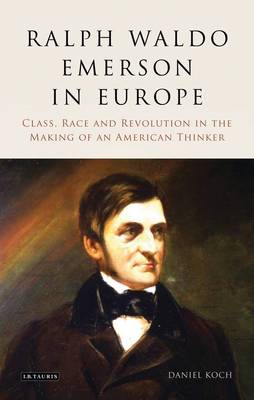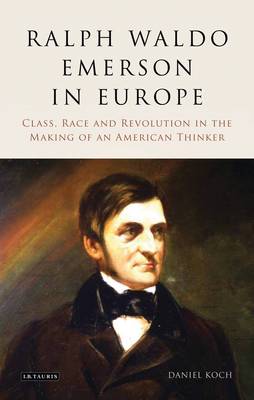
Door een staking bij bpost kan je online bestelling op dit moment iets langer onderweg zijn dan voorzien. Dringend iets nodig? Onze winkels ontvangen jou met open armen!
- Afhalen na 1 uur in een winkel met voorraad
- Gratis thuislevering in België vanaf € 30
- Ruim aanbod met 7 miljoen producten
Door een staking bij bpost kan je online bestelling op dit moment iets langer onderweg zijn dan voorzien. Dringend iets nodig? Onze winkels ontvangen jou met open armen!
- Afhalen na 1 uur in een winkel met voorraad
- Gratis thuislevering in België vanaf € 30
- Ruim aanbod met 7 miljoen producten
Zoeken
Ralph Waldo Emerson in Europe
Class, Race and Revolution in the Making of an American Thinker
Daniel Koch
Paperback | Engels
€ 76,45
+ 152 punten
Omschrijving
As the revolutions of 1848 swept across Europe, Ralph Waldo Emerson, philosopher and founding father of the modern American intellectual tradition, conducted a lecture tour of Great Britain. During this time he witnessed first-hand the 1848 revolutions which swept across Europe; including the protests of the Chartists, the abdication of Louis Philippe in France and the German uprisings. Daniel R. Koch here reveals the ways in which Emerson's experience profoundly influenced the future direction of his work on race, slavery and politics during the 1850s and 1860s - Emerson would become an outspoken abolitionist and libertarian. The result of research in archives on both sides of the Atlantic, Koch analyses how Emerson interacted with British society: coming into contact with beggars and prostitutes, factory owners, ambassadors, proletarians, parliamentarians, students and clerics. He rubbed shoulders with many of the most prominent literary figures of the age, including Dickens, Carlyle and Tennyson. Ralph Waldo Emerson in Europe provides a unique insight into the formative years of a great American thinker.
Specificaties
Betrokkenen
- Auteur(s):
- Uitgeverij:
Inhoud
- Aantal bladzijden:
- 336
- Taal:
- Engels
Eigenschappen
- Productcode (EAN):
- 9781350162112
- Verschijningsdatum:
- 28/05/2020
- Uitvoering:
- Paperback
- Formaat:
- Trade paperback (VS)
- Afmetingen:
- 140 mm x 216 mm
- Gewicht:
- 381 g

Alleen bij Standaard Boekhandel
+ 152 punten op je klantenkaart van Standaard Boekhandel
Beoordelingen
We publiceren alleen reviews die voldoen aan de voorwaarden voor reviews. Bekijk onze voorwaarden voor reviews.











